Factory Colour Samples (cont...)
David,
Very nice, your collection is becoming fabulous.
Did you see my email of this morning about the books ?
You bet I will, Dave!
Jacques, did you see MY email to you of 26 November last year enquiring about the two French Dinky books?
Regards, Jan
Gentleman
You are very knowledgeable about a series of trucks I very much adore and like. I also have a few of them but not nearly enough.
My post this morning is about the string and the comments from Dave about the corrosion on the axle.
I work in the manufacturing business in South Africa. We also came up with similar problems on some of our export items when we tagged them. The string is made from hemp like material. The problem is that it is very acideous and almost immediately react with the material it comes into contact with. When exposed to water or damp the reaction is slow but contineous. I also noticed a model with the string going though the cab. Look at the string again, it is somewhat blackened.To my knowledge this is a sign that some graphite was used on the string as well as that it is not the normal hemp tag line. More of a cotton type string. Remember Hemp is very porous and hidro-scopic.
To be sure that my models will not deteriorate further I would take the hemp string off and replace it with a cotton string. I know you will argue about the originality af the label and string attached. In that case I would simply put the string in a small plastic siplock bag and keep it with the model, but not attached to the model itself. Unfortunately the axle will corrode away in time if left like that.
My penny worth
Dirk Bloem
Potchefstroom
154
Welcome here Dirk, and thank you very much for your expert explanation! Together we will find the answers to the questions raised this way. Perhaps some kind of acid free short piece of straw can carefully be pushed in between the axle and the cord. Nothing so risky, as authenticity is concerned, as separating them, in my opinion. Best regards, Jan
Hello Dirk,
Nice to see you here.
Jan,
I have answered your email privately. A second batch of the book "Dinky Toys les mod
Nothing to add apart from my congratulations, you have added some great toys to your collection.
Kind regards, Stef
I am fascinated by Dirk's reply here, he explains fully what has happened to theaxle on the Tipping Wagon. I was at a loss to explain that the rusting was only apparent where the cord was touching the axle.
I am extremely reluctant to replace the cord and I will inspect it regularly to ensure no further damage occurs. It is at the moment only surface rust so I am happy it is not posing a threat to the axle.
On the Market Gardener's Truck there is no evidence whatsoever of a rust problem so I can only assume that this uses a different type of cord, or has been stored in a drier environment.

I have now purchased a dedicated case to display the three paint samples, I will have this with me at the AGM in Derby in June.
Dave
Hello Dave.
You have several ways of looking at this.
They have been attached to the toys since the 40s and it has resulted only in minor surface rust
In my opinion these models will be like any other Dinky Toy if you separate model and tag (and one should not think about them getting lost definitely; it would not be the first time that something stupid like that happens). In fact they are not meant or suitable for (permanent and/or attractive) display, they are pieces of historic evidence that should be kept in stable, controlled conditions. There are measures enough to think about when it comes to stabilize or improve conservation while not removing the strings/tags.
By the way, Dave, I presume I have seen these samples before. Are they originally from Peter Golden's collection? Kind regards, Jan
I understand from all this interesting talk that the string damages the axle.
Why not insert an inch of split electric wire insulation on the axle. That will separate the string from the metal, it is very easy to make and can be removed instantly, it will not damage the model in any way.
You can choose black if you want it to be discret or yellow/green to make it evident.
Great finds anyway.
As I live in the centre of England, and not a coastal area, I think I should be OK as the weather around here tends to be temperate.
I just feel fortunate to have recently acquired these rather special examples and I will look after them.
Dave
For what it is worth, I happen to agree with you and Jan. Something like that is original only once.... When you start removing anything you risk losIng that originality, and something like those need to be saved as they are as they are historical. I would guess that the little corrosion you see is minimal and not a real threat to the models life.....very nice and glad that you are the custodian!
Terry
I definitely don't intend to remove any labels and I am fully aware of how rare they are.
I will certainly look after them.
Dave
I have done a serious trawl through the internet and looked at as many historical auction catalogues as I have been able to find and I have managed to positively identify 12 Dinky Toy Paint Samples.

There must be more than 12 out there, can anyone here add anything further to this list.
Many thanks
Dave
Hi Dave
Great list but just to be sure does your Daimlers label not say 1946? It appears to have smooth hubs and the colour reminds me of that slightly lighter leaf green that you see on 1946 issues.
It would be interesting to know if any others are owned within the DTCA member base.
Kind regards, Stfan
Hi Stfan
I'm glad to see you are fully awake, you are absolutely correct it is 1946.
Seven months before I was born!!!!
Dave
Hi Dave
Promise that I am not trying to pick holes, but isn
You're correct Stfan, the source is the Christie's South Kensington auction of 14 September 1995. Then, the collection of Geoff Moorehouse, the first owner, was auctioned with lots of pre-production factory trials, tools etc. etc. Geoff worked in the Meccano factory as a product designer in the 1970s, responsible for the initial design of Dinky Toys.
Another batch of colour trials from a former Meccano factory draughtsman was auctioned on 27 September 1996, also at Christie's. Remy-Meeus must have done some successful shopping on these occasions (as he did for instance at a Phillips auction on 19 April 1989, where he bought possibly all first owner Julien Loffet's wooden prototypes). Kind regards, Jan
I have to disagree with some of the comments here guys.
I have just acquired the Christies catalogue from the Fine Toys auction of Friday 27th September 1996. Whilst it contained a lot of drawing, mock-ups, colour trials and working ideas none of the samples on my spreadsheet listed earlier were in that auction. If they were they are not listed in the catalogue.

Some of them are listed in Ramsey's but unfortunately the information in there is not accurate.
What I am trying to establish is how many paint samples with tie-on labels are in existence, it must be more than twelve.
Dave
Hi Dave, I'm sorry to have apparently caused some confusion. I confirmed the 1995 auction as an important source of these items. The subsequent auctions I mentioned were examples of auctions which also included some of those basic production items of Meccano's, of which so many came onto the market in that period, and which were not necessarily the auctions on which the particular items in question (the labelled colour samples) were sold. Kind regards, Jan
Hi Jan
I am not being critical, I asked a specific question and everybody then went off in a different direction' I still am no nearer to finding the answer. I will post the question in the Journal to see if an answer can be found.
Dave
Mok-ups vs colour samples vs pilot lot models.
Michel Viéville was 19 years old whe he joined the drawing department at Bobigny. He gives us some light about the different types of models.

When it was decided to make a new model, the very first thing done was a mock-up often wrongly called a prototype. There are different types of mock ups : the wooden ones and those,made from modified existing models like this 2cv ref 538 with non opening bonnet which was the mock-up for the # 500 with opening bonnet, jewelled headlights and open tilt. These models could be finished in any colour which was available at the time. These models were often sent to the artist who made the drawing for the boxes and the catalogues. This explain why very often the drawings are in a different colour from any of the models sold.
The second stage was to make the master model carved in wood but this is outside the scope of this post.

When the tools had been made, a dozen or so models were cast, painted and assembled; again the colour was what was available on the painting line at the time. The aim of these pre-production models also called pilot lot was to verify that all the parts fit and that the moving parts worked properly. A good example is this yellow Matra 630 which of course could only be issued in French Blue only.

When the first Matra M530 was assembled at Bobigny it was found that there was an interference between the bonnet and the headlights. The Dinky R & D manager called Matra to discus if there was a mistake somewhere. The answer from Matra was that they had not yet opened the bonnet when the headlights were raised; the actual car was modified but it was too late for the Dinky.
The colour samples are different from the mock-ups or the pre-prod models. Only one or two were made with any colour. The British colour samples had identifying labels as discussed widely above but the french ones did not have labels. It is then extremely difficult to say if a model with a veryrare finish is a colour sample or a pre-prod models.
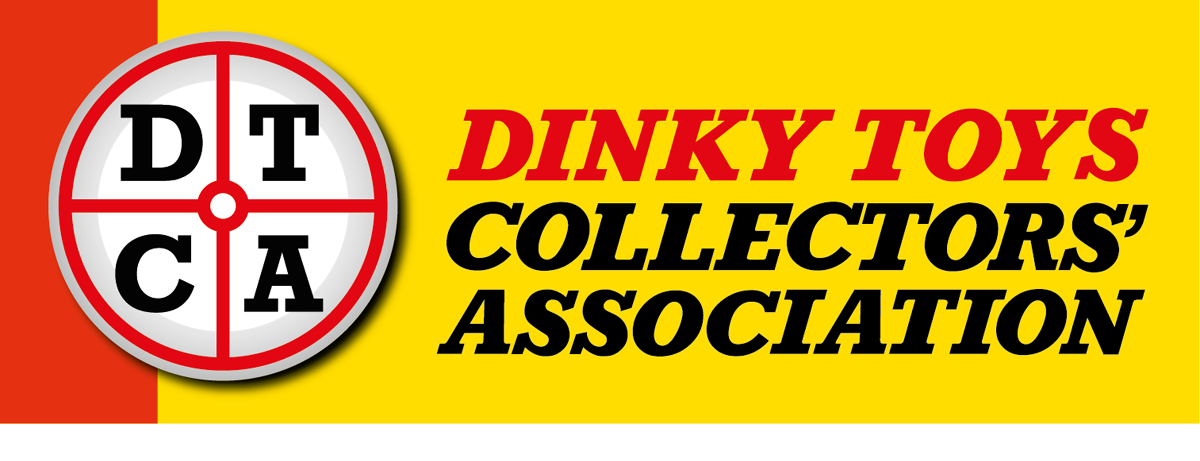

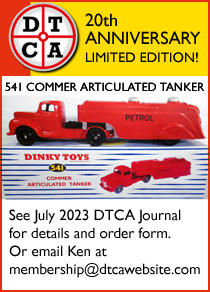
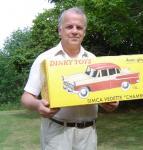
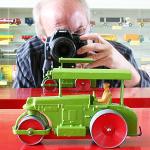


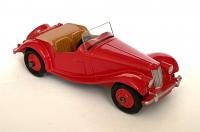
-914 AEC Articulated Lorry (1965-70)
-163 Bristol 450 Sports Coupé (1956-60)
-163 Bristol 450 Sports Coupé (1956-60)
-914 AEC Articulated Lorry (1965-70)
DTCAwebsite upgrade 2023
DTCAwebsite upgrade 2023
DTCAwebsite upgrade 2023
DTCAwebsite upgrade 2023
DTCAwebsite upgrade 2023
DTCAwebsite upgrade 2023
-508 DAF
--14c and 401Coventry Climax Fork Lift Truck (1949-64)
FRENCH DINKY TALBOT LAGO
-Boxes General Discussions including end flaps, both British and French
--14c and 401Coventry Climax Fork Lift Truck (1949-64)
--14c and 401Coventry Climax Fork Lift Truck (1949-64)
-508 DAF
DTCAwebsite upgrade 2023
DTCAwebsite upgrade 2023
DTCAwebsite upgrade 2023
DTCAwebsite upgrade 2023
DTCAwebsite upgrade 2023
-508 DAF
-508 DAF
-508 DAF
New arrivals
New arrivals
DTCAwebsite upgrade 2023
DTCAwebsite upgrade 2023
ORIGINAL MECCANO DINKY TOYS FACTORY BOX ART 175 HILLMAN MINX SALOON + DRAWING
--29c and 290 Double Decker Bus (1938-63)
DTCAwebsite upgrade 2023
DTCAwebsite upgrade 2023
DTCAwebsite upgrade 2023
DTCAwebsite upgrade 2023